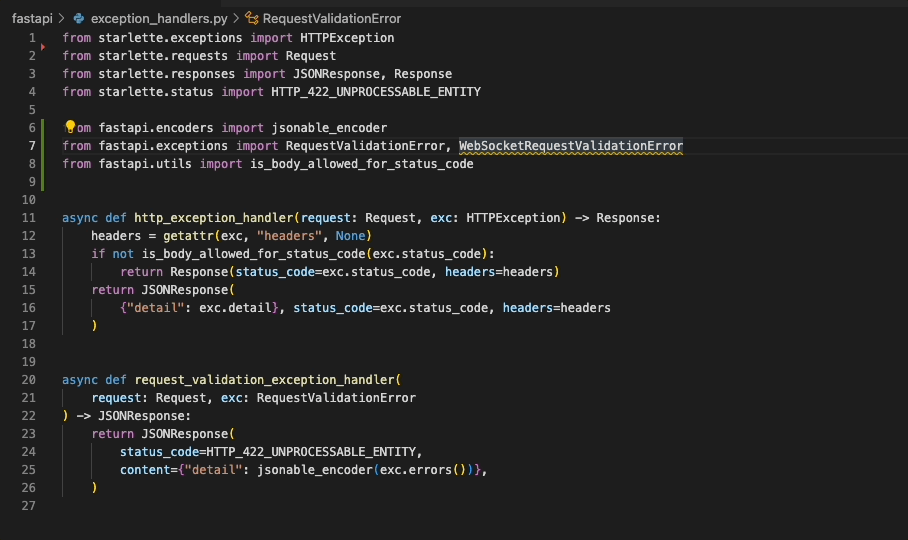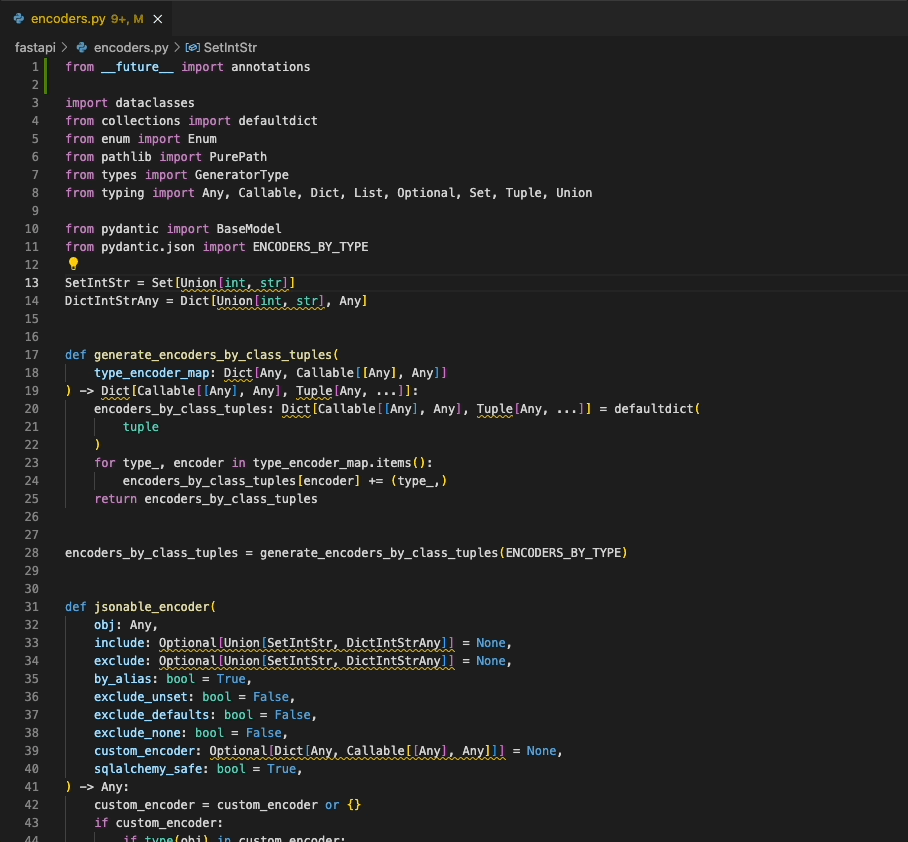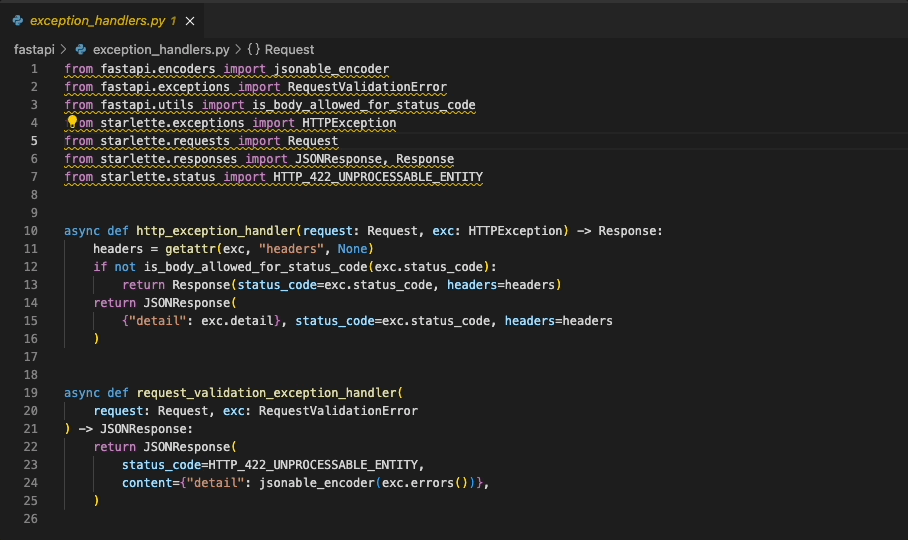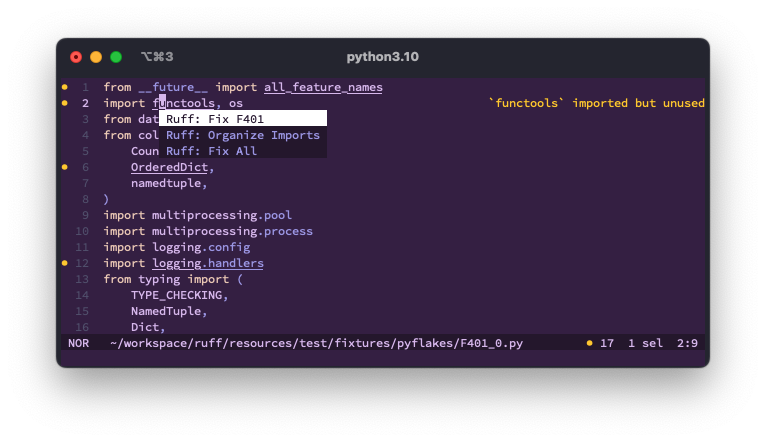A Language Server Protocol implementation for Ruff, an extremely fast Python linter and code transformation tool, written in Rust.
Enables Ruff to be used in any editor that supports the LSP, including Neovim, Sublime Text, Emacs and more.
For Visual Studio Code, check out the Ruff VS Code extension.
ruff-lsp supports surfacing Ruff diagnostics and providing Code Actions to fix them, but is intended to be used alongside another Python LSP in order to support features like navigation and autocompletion.
ruff-lsp is available as ruff-lsp on PyPI:
pip install ruff-lspAn Alpine Linux package
is available in the testing repository:
apk add ruff-lsp
An Arch Linux package is
available in the Extra repository:
pacman -S ruff-lsp
Once installed, ruff-lsp can be used with any editor that supports the Language Server Protocol,
including Neovim, Emacs, Sublime Text, and more.
For example, to use ruff-lsp with Neovim, install ruff-lsp from PyPI along with
nvim-lspconfig. Then, add something like the following
to your init.lua:
-- See: https://github.com/neovim/nvim-lspconfig/tree/54eb2a070a4f389b1be0f98070f81d23e2b1a715#suggested-configuration
local opts = { noremap=true, silent=true }
vim.keymap.set('n', '<space>e', vim.diagnostic.open_float, opts)
vim.keymap.set('n', '[d', vim.diagnostic.goto_prev, opts)
vim.keymap.set('n', ']d', vim.diagnostic.goto_next, opts)
vim.keymap.set('n', '<space>q', vim.diagnostic.setloclist, opts)
-- Use an on_attach function to only map the following keys
-- after the language server attaches to the current buffer
local on_attach = function(client, bufnr)
-- Enable completion triggered by <c-x><c-o>
vim.api.nvim_buf_set_option(bufnr, 'omnifunc', 'v:lua.vim.lsp.omnifunc')
-- Mappings.
-- See `:help vim.lsp.*` for documentation on any of the below functions
local bufopts = { noremap=true, silent=true, buffer=bufnr }
vim.keymap.set('n', 'gD', vim.lsp.buf.declaration, bufopts)
vim.keymap.set('n', 'gd', vim.lsp.buf.definition, bufopts)
vim.keymap.set('n', 'K', vim.lsp.buf.hover, bufopts)
vim.keymap.set('n', 'gi', vim.lsp.buf.implementation, bufopts)
vim.keymap.set('n', '<C-k>', vim.lsp.buf.signature_help, bufopts)
vim.keymap.set('n', '<space>wa', vim.lsp.buf.add_workspace_folder, bufopts)
vim.keymap.set('n', '<space>wr', vim.lsp.buf.remove_workspace_folder, bufopts)
vim.keymap.set('n', '<space>wl', function()
print(vim.inspect(vim.lsp.buf.list_workspace_folders()))
end, bufopts)
vim.keymap.set('n', '<space>D', vim.lsp.buf.type_definition, bufopts)
vim.keymap.set('n', '<space>rn', vim.lsp.buf.rename, bufopts)
vim.keymap.set('n', '<space>ca', vim.lsp.buf.code_action, bufopts)
vim.keymap.set('n', 'gr', vim.lsp.buf.references, bufopts)
vim.keymap.set('n', '<space>f', function() vim.lsp.buf.format { async = true } end, bufopts)
end
-- Configure `ruff-lsp`.
-- See: https://github.com/neovim/nvim-lspconfig/blob/master/doc/server_configurations.md#ruff_lsp
-- For the default config, along with instructions on how to customize the settings
require('lspconfig').ruff_lsp.setup {
on_attach = on_attach,
init_options = {
settings = {
-- Any extra CLI arguments for `ruff` go here.
args = {},
}
}
}Upon successful installation, you should see Ruff's diagnostics surfaced directly in your editor:
Note that if you're using Ruff alongside another LSP (like Pyright), you may want to defer to that
LSP for certain capabilities, like textDocument/hover:
local on_attach = function(client, bufnr)
-- Disable hover in favor of Pyright
client.server_capabilities.hoverProvider = false
end
require('lspconfig').ruff_lsp.setup {
on_attach = on_attach,
}Ruff also integrates with coc.nvim:
"languageserver": {
"ruff-lsp": {
"command": "ruff-lsp",
"filetypes": ["python"]
}
}To use ruff-lsp with Sublime Text, install Sublime Text's LSP
and LSP-ruff package.
Upon successful installation, you should see errors surfaced directly in your editor:
To use ruff-lsp with Helix, add something like the following to
~/.config/helix/languages.toml:
[[language]]
name = "python"
scope = "source.python"
language-server = { command = "ruff-lsp" }
config = { settings = { args = [] } }Upon successful installation, you should see errors surfaced directly in your editor:
Future versions of Helix support the use of multiple language servers. The following configuration
would enable the use of ruff-lsp alongside a language server like pyright:
[[language]]
name = "python"
roots = ["pyproject.toml"]
language-servers = ["pyright", "ruff"]
[language-server.pyright]
command = "pyright-langserver"
args = ["--stdio"]
[language-server.ruff]
command = "ruff-lsp"
config = { settings = { run = "onSave" } }To use ruff-lsp with Lapce, install the lapce-ruff-lsp
plugin (which wraps ruff-lsp) from the Lapce plugins panel.
Upon successful installation, you should see errors surfaced directly in your editor:
To use ruff-lsp with Kate, add something like the following to
the LSP client's settings.json:
{
"servers": {
"python": {
"command": ["ruff-lsp"],
"url": "https://github.com/astral-sh/ruff-lsp",
"highlightingModeRegex": "^Python$"
}
}
}Ruff's automatic fixes are labeled as "safe" and "unsafe". By default, the "Fix all" action will not apply unsafe
fixes. However, unsafe fixes can be applied manually with the "Quick fix" action. Application of unsafe fixes when
using "Fix all" can be enabled by setting unsafe-fixes = true in your Ruff configuration file or adding
--unsafe-fixes flag to the "Lint args" setting.
See the Ruff fix docs for more details on how fix safety works.
The exact mechanism by which settings will be passed to ruff-lsp will vary by editor. However,
the following settings are supported:
| Settings | Default | Description |
|---|---|---|
| lint.args | [] |
Additional command-line arguments to pass to ruff check, e.g., "args": ["--config=/path/to/pyproject.toml"]. Supports a subset of Ruff's command-line arguments, ignoring those that are required to operate the LSP, like --force-exclude and --verbose. |
| lint.run | onType |
Run Ruff on every keystroke (onType) or on save (onSave). |
| path | [] |
Path to a custom ruff executable, e.g., ["/path/to/ruff"]. |
| interpreter | [] |
Path to a Python interpreter to use to run the linter server. |
| organizeImports | true |
Whether to register Ruff as capable of handling source.organizeImports actions. |
| fixAll | true |
Whether to register Ruff as capable of handling source.fixAll actions. |
| codeAction.fixViolation.enable | true |
Whether to display Quick Fix actions to autofix violations. |
| logLevel | error |
Sets the tracing level for the extension: error, warn, info, or debug. |
| codeAction.disableRuleComment.enable | true |
Whether to display Quick Fix actions to disable rules via noqa suppression comments. |
- Install
just, or see thejustfilefor corresponding commands. - Create and activate a virtual environment (e.g.,
python -m venv .venv && source .venv/bin/activate). - Install development dependencies (
just install). To run thetest_format.pytest, you need to install a custom ruff build with--features format, e.g.maturin develop --features format -m ../ruff/crates/ruff_cli/Cargo.toml. - To automatically format the codebase, run:
just fmt. - To run lint and type checks, run:
just check. - To run tests, run:
just test. This is just a wrapper around pytest, which you can use as usual.
MIT










